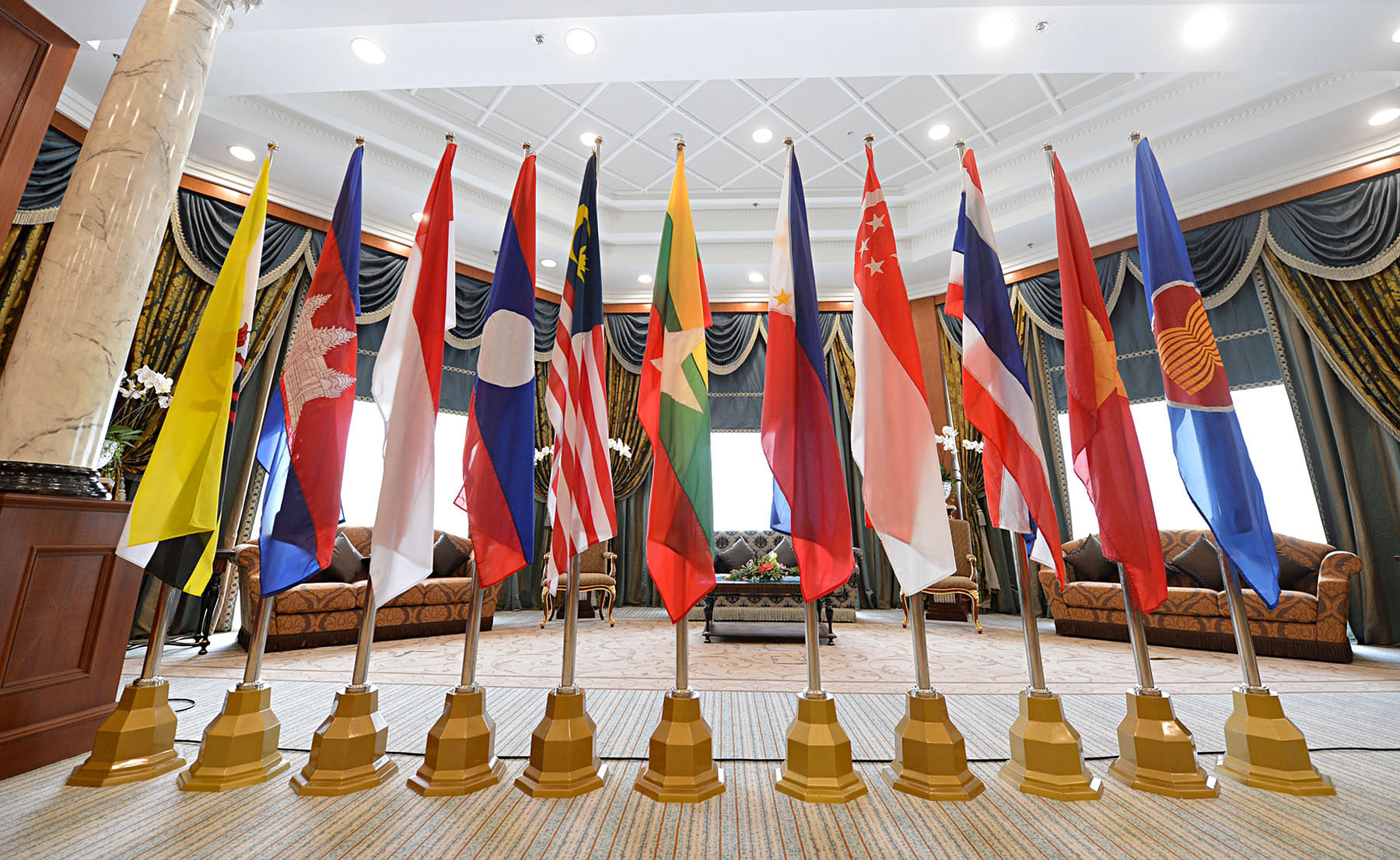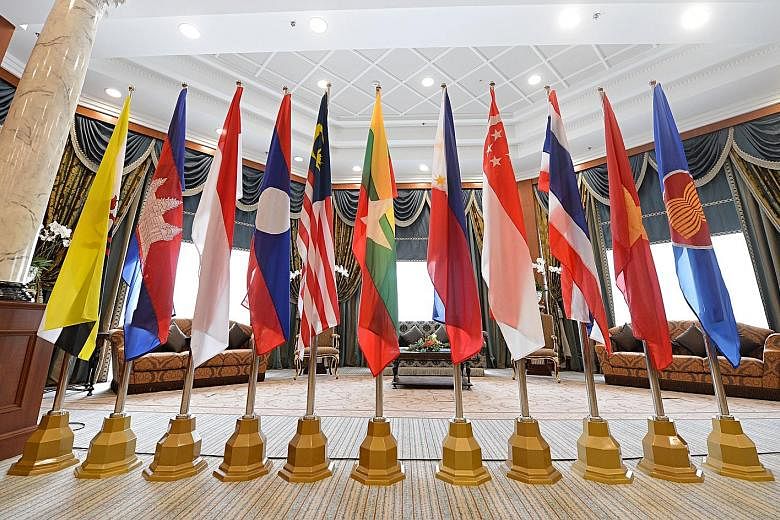United States President Donald Trump's inauguration speech on Jan 20 was long on aspirational statements but short on substance. Yet, his overarching message remained consistent - America first, take back jobs, no more defending or enriching foreign countries at the expense of the American people.
If anything, these statements served only to reinforce the view that, under the new administration, US foreign policy is about to change in discouraging ways for its friends and allies in Asia.
Before the inauguration, Mr Trump had already hinted that the depth of US engagement in Asia was likely to recede - even as his administration articulated a more hawkish position on China. As if this was not worrying enough for South-east Asia, Chinese assertiveness continues to gather pace, both in the welcome form of investments and economic ventures, and in the less-welcome trend towards diplomatic browbeating. As a collection of small and medium-sized countries, South-east Asia will inevitably be caught up in the turbulence of geostrategic crosswinds.
This state of affairs has hastened discussion in South-east Asia on how the region should position itself amid growing Sino-US competition. For years, regional leaders have stressed that their countries should not be placed in the position of having to choose sides. But the current uncertainties - exacerbated by Mr Trump's provocative remarks - have prompted growing concern among regional governments that they might indeed be forced to make choices. The warming of China's ties with Malaysia and particularly the Philippines is already being cast in such terms by the media.
Rather than examining the policies of regional states towards the US and China, it would be more useful to step back and consider how South-east Asian nations might handle these two great powers.
FALSE DICHOTOMY
"Choosing sides" immediately conjures up images of a zero-sum proposition that involves trade-offs, and where choosing one side ipso facto means distance from the other. This was arguably best illustrated during the Cold War era, when there were two clearly defined camps. But under present conditions, where the world is increasingly interdependent, interconnected and digital technology-driven, talk of choosing sides between the US and China represents a false dichotomy predicated on flawed assumptions. There are several reasons this is the case:

First, Chinese leaders will grudgingly admit in private that the US has had a restraining effect on Japan and Taiwan, which are consequential issues for Beijing. Only the relationship with the US assumes a greater degree of importance for China. Even if Beijing might desire to limit Washington's strategic reach in the region, this does not mean it wants the US to disengage entirely.
Second, a Trump presidency is not likely to disengage entirely from South-east Asia, despite a reduced interest in and commitment to the region. Although the halcyon days of America's "rebalance" to Asia under the Obama administration are gone, the US still has much to offer the region - and much to gain in advancing American economic and security interests. This is something that senior US officials and Republican Party elders are keenly aware of, even if the President remains nonchalant.
Third, China is already an economic powerhouse whose omission from the regional economic, security and political order is simply unfathomable.
Fourth, while rough waters doubtless lie ahead for Sino-US relations, the reality is that the scope and depth of bilateral relations have widened and deepened considerably. Previously, the issues of bilateral trade, Taiwan and exchange rates mainly shaped these ties. Today, the scope has broadened to include territorial disputes, trade arrangements and economic initiatives in Asia and global issues such as climate change, denuclearisation, cyber security and counter-terrorism.
These issues are being negotiated through more than 60 official channels and countless informal ones. The Sino-American relationship is one of the most complex in world history. The manner and extent to which their interests intertwine and overlap cannot simply be wished away by hawks, naysayers or Trump-isms.
As a result, applying a zero-sum logic to South-east Asia's relations with the US and China does not hold. Bracketing out either the US or China from the equation of regional affairs is neither possible nor desirable for the US, China or South-east Asia.
HISTORY LESSONS
Implicit in discussions about "choosing sides" is the assumption that small states have an incentive to do so to further their security or economic interests. But is this assumption valid?
Interest in the Peloponnesian War has been rekindled recently by talk of the Thucydides Trap, a term coined by Harvard scholar Graham Allison to explain the risks of increased conflict when a rising power comes up against an established power.
Yet, the attention this term has garnered detracts from a rich trove of other historical lessons that can be gleaned from Thucydides' Melian Dialogue. For instance, the Peloponnesian War was not strictly fought between Athens and Sparta, but rather between two alliances: the Delian League and Peloponnesian League. Before the outbreak of the war, small Greek city-states had already proactively aligned themselves with one of the powers for various reasons, including fighting Persian invaders and sharing the spoils of victory.
But these small city-states ended up as vassals from whom fealty and tribute were expected. Sparta and especially Athens would eventually exact a heavy price from them, including dragging them into war despite their reluctance. For the small city-states, what had begun as a venture to secure their interests ended up being very costly.
In pre-modern South-east Asian history, Malay courts frequently sent bunga emas (golden flowers) and bunga perak (silver flowers) to their larger neighbour, Siam. They thought of these gifts as gestures of friendship, but Siam's kings saw them as tributes offered in recognition and acceptance of Siamese suzerainty. When one kingdom, Patani, later refused Siam's "requests" to supply soldiers for wars against Burma, it was invaded by Siam and eventually subjugated in 1786. The wounds from these conflicts have yet to heal.
It would be foolish to think that these small states could have avoided conflict if they had stood by the wayside and avoided making a choice. Indeed, it is not difficult to imagine that the Greek city-states or the Malay sultanates might still have been subjugated even if they had refused to choose between or accept the demands of the great powers.
But this should not detract from three important lessons for small states confronted with the matter of choice.
First, when small states gravitate into the orbit of great powers, pressure and expectations will almost certainly mount on them to align themselves further, even at the expense of their own sovereignty and national interests.
Second, even if small states are prepared to genuflect in the direction of a great power, this might not necessarily guarantee security or prosperity.
Third, while great powers are often unable to understand the dilemmas and travails of small states, these states must be aware that great power politics operates according to its own logic.
What can South-east Asian countries do as great power rivalry intensifies in their backyard? One essential response is to preserve unity and cohesion, to achieve some measure of autonomy. This means regional states should coalesce and deepen integration under Asean in order to transmit a consistent message that stable and constructive Sino-American relations are important for the region and the world.
Second, while Sino-US relations will be the primary factor that shapes regional affairs for the foreseeable future, this relationship is by no means the only determinant of stability. Other external powers also feature prominently in the regional security and economic architecture, and South-east Asian states should further engage and deepen ties with Japan, India, Australia and Russia.
With the uncertainties ushered in by the Trump administration, as well as the certainties of growing Chinese assertiveness, South-east Asia is facing a bracing new reality. Adjusting to this landscape was always going to involve some shifting of foreign policy postures.
On that score, it is perfectly understandable and reasonable for the region's states to recalibrate ties with the US and China. This should not mean that such adjustments must be made under zero-sum conditions - nor that they should be governed by zero-sum assumptions or produce zero-sum outcomes.
South-east Asia should be keenly aware that, as "price takers" in a game dictated by great powers, they have neither the wherewithal nor the standing to influence proceedings in any fundamental way. It is precisely for this reason that they should not run the risk of taking sides, because such a strategy could ultimately prove self-defeating.
This is not to say that great powers can do what they will, while small states should resign themselves to suffer what they must. With creativity, ingenuity and a unity of purpose, there is more than a fair chance that a coherent and united South-east Asia would still be able to navigate the rough waters of great power politics without being dragged under.
- The writer is dean and professor of comparative and international politics at the S. Rajaratnam School of International Studies, Nanyang Technological University, in Singapore.
- This article was first published in Nikkei Asian Review.

